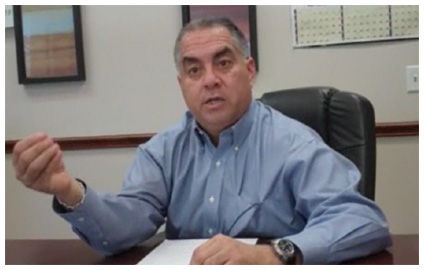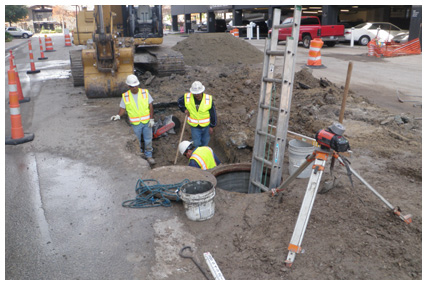 Earlier this year, I sat down with Gregg Reyes, President and CEO of Reytec Construction Resources, Inc., to learn about his company and how it grew from a two-person contracting company operating out of a private home to the go-to company for specialty concrete work which it has become today. Reytec is a provider of many types of concrete excavation and structural services, specializing in underground utility work, above ground paving and structures, and site preparation for both public and private projects.
Earlier this year, I sat down with Gregg Reyes, President and CEO of Reytec Construction Resources, Inc., to learn about his company and how it grew from a two-person contracting company operating out of a private home to the go-to company for specialty concrete work which it has become today. Reytec is a provider of many types of concrete excavation and structural services, specializing in underground utility work, above ground paving and structures, and site preparation for both public and private projects.
Reytec was started in 1997. At that time, Reytec was a general contracting company consisting of only Reyes and his wife, operating out of their home, and hiring subcontractors to help complete projects. While working on a restaurant project, Reyes met an older man who was running a concrete crew for one of the subcontractors Reyes had hired, and the two of them truly hit it off. The man took Reyes under his wing and advised him, “You know, you ought to get your own crews, and run your own jobs.” On one of Reyes’s next jobs, he decided to take that advice. Reyes had always wanted to get more involved in the construction of the projects as opposed to just the management side – a desire he still exhibits today. So when a warehouse project with concrete tilt walls and a lot of underground utility work came along, Reyes hired his friend and started a weekly payroll for his crew. This group of about 12 workers was cross-trained in underground utility work, dirt work, and concrete work – influencing the direction the company would ultimately take. Hiring the concrete crew and thereby self-performing the majority of the project (they brought in another company to erect the steel structure) allowed Reytec to offer a competitive bid for the project and still make a profit. This was a real “eye-opener” for Reyes and his wife, and motivated them to continue to find ways to offer more of their construction services directly rather than with subcontractors.
At first Reytec only worked in the private sector, but some of Reyes’s friends who worked on projects for the City of Houston encouraged him to get Reytec certified as a minority company in order to increase eligibility for city jobs. Reyes did not pursue this until he was approached by Hensel Phelps Construction Co., a general contracting and construction management firm, who said that they had plenty of “HUB work” and that they needed quality companies like Reytec to get certified and come to work on their jobs. Reyes then learned about the Historically Underutilized Business (HUB) Program, where the State of Texas certifies certain small businesses (based on gross receipts and employment levels) as HUB contractors. All publicly-funded projects in Texas are awarded with “HUB goals” requiring that certain percentages of the work be performed by HUB-certified companies. This provided an exciting opportunity for Reyes, who explained:
“In this particular case, Hensel Phelps had the $120 million MD Anderson Cancer Prevention Building and the $375 million Lowry and Peggy Mays Ambulatory Clinical Building, and their HUB goal for both of those projects (which totaled about $500 million) was 28 percent.” Reytec became HUB certified and began working on Hensel Phelps projects doing concrete and underground utility work. Then in 2001, Hensel Phelps came to Reyes with a proposal which was a turning point for Reytec. Reytec agreed to complete several different types of needed services on one of the MD Anderson projects, including demolition, fence erecting, temporary sidewalk and detour creating, even re-aligning a road next to the clinic – an assignment which required special permissions and scheduling with hospital administration and the city. In the end, Reytec completed $25 million worth of work at that site over a 5-year period.
Reytec became HUB certified and began working on Hensel Phelps projects doing concrete and underground utility work. Then in 2001, Hensel Phelps came to Reyes with a proposal which was a turning point for Reytec. Reytec agreed to complete several different types of needed services on one of the MD Anderson projects, including demolition, fence erecting, temporary sidewalk and detour creating, even re-aligning a road next to the clinic – an assignment which required special permissions and scheduling with hospital administration and the city. In the end, Reytec completed $25 million worth of work at that site over a 5-year period.
This kind of flexibility and willingness to differentiate themselves from their competitors allowed Reytec to continue to build relationships with other significant clients including the City of Houston and JE Dunn Construction. Steady work led to growth and by 2010 Reytec had graduated out of HUB qualification because it could no longer be considered a small business.
As the company grew, so did the challenges. Reyes remarked “When [as a company] you are growing, you are not just growing organization, you are growing equipment, logistics, and safety.” After operating for almost 14 years without a single OSHA safety violation, Reytec received their first write-ups after a few OSHA site inspections. The reasons for the citations were detail oriented, such a lifting device which was missing a tag, so even though the company continued to operate without accidents or injuries, they decided to become even more detailed and deliberate about the way each person within the company approached job safety.
They hired a safety consultant who began to make site inspections and help them avoid future OSHA fines. They implemented a more thorough Job Hazard Analysis (JHA) procedure, where each safety issue was outlined and planned for before work on any project could begin. They came up with a “three strikes and you are out” system and began to look for ways to reward those employees who upheld the required standards.
Reytec suffered from the economic downturn, and while they did have to let some of their staff go, they managed to keep the remainder of the company healthy by diversifying the types of work they did. For example, they began to repair broken water lines and replace fire hydrants for the City of Houston. As the economy turned back around and building began to pick up, they started doing decorative hardscapes – curbing and corner plazas – in the upscale urban area near the Galleria.
I asked Reyes to tell me about some of the different types of skilled work that Reytec employees do. Reytec employees are guided by superintendents who are each specific to the different types of work. There are project superintendents, concrete paving superintendents, and underground utility superintendents. Then there are foremen, heavy equipment operators, pipe layers, and helpers. Each different category of work which Reytec provides requires different types of skilled labor, so there are many levels and opportunities to advance within the company.
Training is largely done within the company, as there is no institute that teaches the skills needed for many of the jobs. When hiring new employees, Reyes explained that they try to hire people that have the potential to grow into some of the specialized roles. He admits that this work is not for everyone, and that less than half of new hires last in the long run. Successful employees must be intelligent, physically fit, and have a good work ethic. Superintendents and foremen who see these qualities in the helpers are encouraged to train and teach them the skills that will allow them to advance within the company. During weekly project meetings, these supervisors attempt to identify these “diamonds in the rough” and help promote them to higher positions where their talent can be nurtured and developed.
Much of the success of the company may be attributed to the attitude of respect and compassion which begins at the top of the company. Reyes explained his philosophy that when employees are treated with respect they don’t just feel valued, but they work more productively. He shared that he learned the importance of treating people well from his parents. His parents taught him and his nine siblings to always treat others with respect and to remember how blessed they were. His father worked as a superintendent for a railroad company, and often said it was important to treat the laborers who worked for him just as he would have liked to be treated himself. Today Reyes has brought that same attitude to Reytec. He stated:
“When you come from that background, you look at the guys who work for you and you say ‘That’s my Dad when he first started’, or ‘That used to be me’. It’s important that you have compassion for your employees.”
Watch excerpts from the interview in the 10½ minute video below.
Contractor Builds Business on Hard Work, Versatility, and Compassion [VIDEO]
by Elizabeth McPherson | March 14, 2013



Add new comment